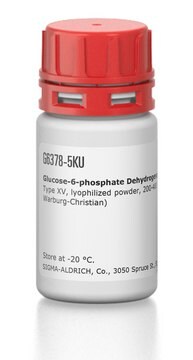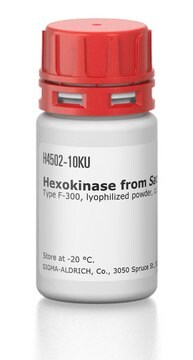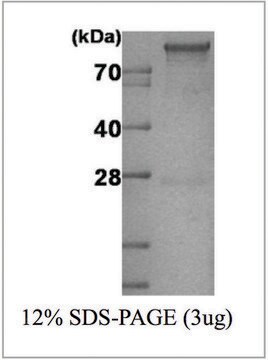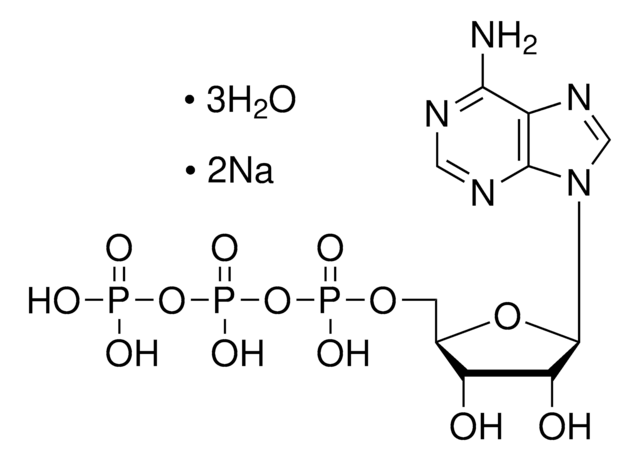HKG6PDH-RO
Roche
Hexokinase/Glucose-6-Phosphate Dehydrogenase (HK/G6P-DH)
from yeast/Leuconostoc, overproducer
Sinonimo/i:
G6P-DH, Glucose-6-Phosphate DehydrogenaseHK, Hexokinase
Autenticatiper visualizzare i prezzi riservati alla tua organizzazione & contrattuali
About This Item
Codice UNSPSC:
12352204
Prodotti consigliati
Origine biologica
yeast
Livello qualitativo
Stato
suspension
PM
dimer 110,000 Da
Confezionamento
pkg of 10 mL (10737275001 [30 mg])
pkg of 5 mL (10127825001 [15 mg])
Produttore/marchio commerciale
Roche
Concentrazione
3.21 mg/mL
tecniche
activity assay: suitable
Colore
white
pH
5.5-6.5
Solubilità
water: miscible
Compatibilità
suitable for UV spectrophotometry and general use
applicazioni
life science and biopharma
Temperatura di conservazione
2-8°C
Descrizione generale
Hexokinase is responsible for catalyzing the first step of glycolysis. It results in the formation of glucose-6-phosphate and ADP from glucose and ATP. Glucose-6-phosphate dehydrogenase is a crucial enzyme in the pentose phosphate pathway. It is responsible for the conversion of glucose-6-phosphate and NADP+ (nicotinamide adenine dinucleotide phosphate) to 6-phosphogluconolactone and NADPH.
Applicazioni
Hexokinase/Glucose-6-phosphate dehydrogenase has been used for the determination of plasma glucose levels.
Componenti
EC 2.7.1.1 & 1.1.1.49
Definizione di unità
One unit (U) HK will phosphorylate 1 μmol of D-glucose in one minute at +25 °C and pH 7.6.
One unit (U) G6P-DH will oxidize 1 μmol of glucose-6-phosphate in one minute at +25 °C and pH 7.6.
The coupled assay produces 1 μmol of NADH per μmol of D-glucose phosphorylated.
Volume Activity: 340 U hexokinase/ml at +25 °C with glucose and ATP as the substrates. 170 U glucose-6-phosphate dehydrogenase/ml at +25 °C with glucose-6-phosphate as the substrate
One unit (U) G6P-DH will oxidize 1 μmol of glucose-6-phosphate in one minute at +25 °C and pH 7.6.
The coupled assay produces 1 μmol of NADH per μmol of D-glucose phosphorylated.
Volume Activity: 340 U hexokinase/ml at +25 °C with glucose and ATP as the substrates. 170 U glucose-6-phosphate dehydrogenase/ml at +25 °C with glucose-6-phosphate as the substrate
Stato fisico
Suspension in 3.2 M ammonium sulfate solution, pH approximately 6. Prepared by mixing hexokinase with G6P-DH. HK:G6P-DH approximately 2:1 with regard to protein content.
Altre note
For life science research only. Not for use in diagnostic prodcedures.
Codice della classe di stoccaggio
12 - Non Combustible Liquids
Classe di pericolosità dell'acqua (WGK)
WGK 1
Punto d’infiammabilità (°F)
does not flash
Punto d’infiammabilità (°C)
does not flash
Scegli una delle versioni più recenti:
Possiedi già questo prodotto?
I documenti relativi ai prodotti acquistati recentemente sono disponibili nell’Archivio dei documenti.
I clienti hanno visto anche
H Pelicano et al.
Oncogene, 25(34), 4633-4646 (2006-08-08)
Most cancer cells exhibit increased glycolysis and use this metabolic pathway for generation of ATP as a main source of their energy supply. This phenomenon is known as the Warburg effect and is considered as one of the most fundamental
Miguel Vázquez-Velasco et al.
Nutricion hospitalaria, 32(6), 2718-2724 (2015-12-17)
Type 2 diabetes is a very prevalent chronic disease. Among dietary factors for its prevention and treatment, interest has grown in satiating fibre (konjac glucomannan) and spirulina. Our previous studies suggest that glucomannan itself and/or in conjunction to spirulina displayed
K Gottlob et al.
Genes & development, 15(11), 1406-1418 (2001-06-08)
The serine/threonine kinase Akt/PKB is a major downstream effector of growth factor-mediated cell survival. Activated Akt, like Bcl-2 and Bcl-xL, prevents closure of a PT pore component, the voltage-dependent anion channel (VDAC); intracellular acidification; mitochondrial hyperpolarization; and the decline in
Robert C Stanton
IUBMB life, 64(5), 362-369 (2012-03-21)
Glucose-6-phosphate dehydrogenase (G6PD) is the rate-limiting enzyme of the pentose phosphate pathway. Many scientists think that the roles and regulation of G6PD in physiology and pathophysiology have been well established as the enzyme was first identified 80 years ago. And
Il team dei nostri ricercatori vanta grande esperienza in tutte le aree della ricerca quali Life Science, scienza dei materiali, sintesi chimica, cromatografia, discipline analitiche, ecc..
Contatta l'Assistenza Tecnica.









